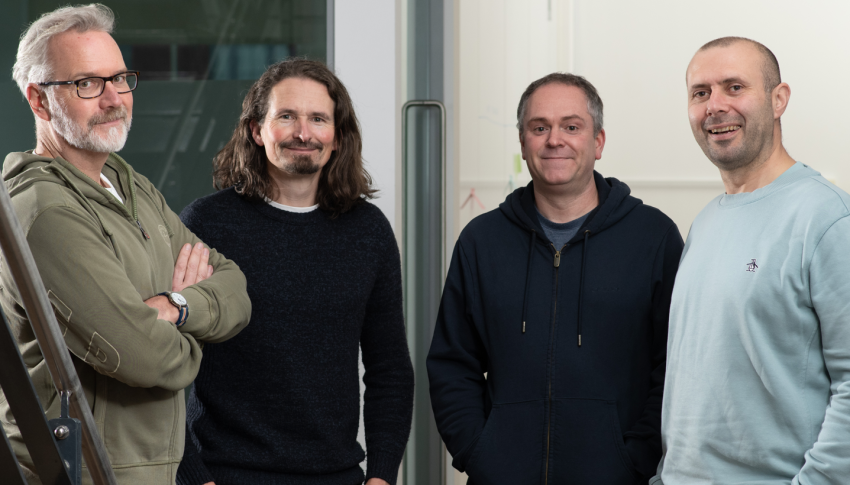
Our next ‘In Conversation’ is with Prof Paul Watson, Director, National Innovation Centre for Data (NICD). The NICD helps organisations learn new data skills, supporting them to gain an insight from their data enabling them to become more productive.
The North East has one of the most creative and exciting digital technology clusters outside of London. It is a leading location for world-class facilities, specific support networks and unique opportunities for the digital sector including unique strengths in immersive technology, data, AI, esports, and software development.
- Please tell us about your role as Director of NICD?
I’m the Director of NICD, Professor of Computer Science at Newcastle University and a Fellow of the Alan Turing Institute. At NICD I’m privileged to lead a wonderful team who have made a positive impact on numerous private and public sector organisations.
My role is to ensure we identify and realise opportunities to have a real impact on the region and the UK – which is made easier because we have such an innovative, talented team with rare skills that are in huge demand.
- What is the NICD? Why is it such an important national asset?
Companies and public sector organisations are drowning in data. They can often see that this could help them gain insights into their work, help them optimise their existing operations, and launch new data-driven products and services. But, very few organisations of whatever size, from SMEs to multinationals, from foodbanks to the NHS, have the data science skills needed to realise the potential of data to transform their business. Some organisations try to recruit to fill this skills gap, but that’s tough as these skills are in short supply, and salary costs are high. Therefore, we take a different approach. Most organisations have talented existing employees, often in their IT department, and so we focus on upskilling them so that they can add the data science skills the organisation needs to their existing portfolio. We do this by working closely with them on collaborative projects that tackle the organisation’s specific challenges and opportunities, using their own data, and their own infrastructure. This is a much more focussed and time-effective way of building skills than sending key staff on generic data science training courses.
- Why do you think Newcastle was successful in the bid to secure the NICD?
Newcastle University has tremendous strength in data science and a real commitment to use that strength to benefit the UK economy and society. We have computer scientists and mathematicians designing new ways to extract value from data, and we then apply these new techniques on real data drawn from across the university and beyond. For example, Newcastle has many medical researchers striving to understand and tackle the major health problems facing individuals and society – we work closely with them to help extract insights from the data they are collecting. It is the quality of Newcastle’s work on data science that makes companies want to work with us – NICD gives a clear route to turn this expertise into innovation for the benefit of people, society and the economy.
- How does the NICD work with companies to help them with understanding their data?
We have designed and honed a process that works well – we’ve run successful projects with over 60 organisations in the last 3 years. It starts with an informal chat to discuss their data-related issues, what business problem they are addressing, and what data is there to work with. We then hold a free joint “Discovery Workshop” to dig deeper. The organisation explains the problem, and our team of data scientists start to explore the opportunities with them. If both sides agree that a project is feasible, we define the scope together, agree the duration (typically three to six months) and sign a formal contract. There is a cost, but the good news is that our rates are subsidised. With the scope agreed, we run a collaborative project, with our team of data experts helping to gain insight from the data and find solutions to the business problems. A typical project might create operational efficiencies or ideas for new data-driven products and services. But, most importantly, we transfer data skills into the organisation so that they can identify and realise new opportunities.
One example is our work with Connected Energy who specialise in technology for grid decarbonisation. We worked with them to gain insights into second-life EV batteries that enabled them to monitor the batteries to optimise their outputs and to predict future capacities.
Another is our work with Newcastle Building Society to improve customer retention. We worked with the product development team, who previously had little coding experience, helping them develop an innovative data model to identify, and categorise, mortgage customers approaching the end of their fixed-rate period.
Their CEO, Andrew Haigh, says of NICD’s approach: “The fantastic thing is that, rather than have to find new resources or outsource that process, we could get properly into skills transfer and development of the people that we already had within our existing team”
- Why is North East England a great place for AI and Data Businesses to locate?
The North East has become a real centre of expertise in AI and Data Science. Its set of excellent universities are generating a stream of talent through their undergraduate and postgraduate data science programmes. And there are now a growing number of companies doing exciting work that means we are able to retain more of the talent we produce, and attract talent from elsewhere.
This is all supported by the innovation and energy shown by the local councils, inward investment organisations, and the North of Tyne Combined Authority, who are all passionate about creating an environment that supports the creation of more and better jobs.
Then there are the proactive industry organisations like Dynamo North East that have created strong networks of key people across the industry, working together for everyone’s mutual benefit.
And finally, the North East is a wonderful place to live – I say this as someone who was born and brought up in the region, and chose to bring up my own family here. As I say when talking to people thinking of relocating to a job in Newcastle, there are very few places in the entire world where you can choose between living in a medieval market town, in the heart of the country, by the coast or in a vibrant city, and still be able to commute into work by public transport in less than half an hour.
I returned to the North East 27 years ago after having lived elsewhere for 15 years, and I’ve never regretted it.
- If a business in interested in working with NICD, how can they get in contact?
Our website explains what we do, and we can be contacted from it: https://www.nicd.org.uk/contact-us . We’re always keen to talk to organisations about how we could help: so we’d encourage anyone who wants a chat to get in touch.
For more information about North East England’s tech and digital sector visit our dedicated page







